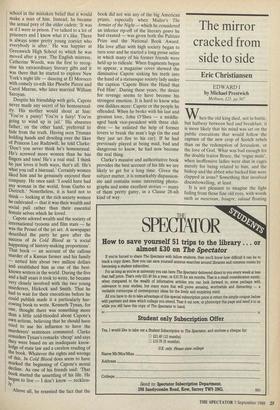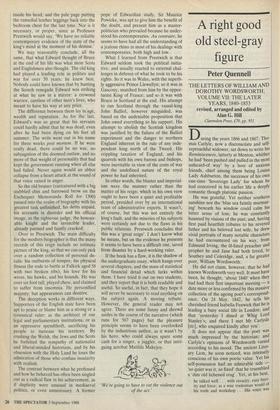The mirror cracked from side to side
Eric Christiansen
EDWARD I by Michael Prestwich Methuen, £25, pp.567 When the old king died, not in battle, but halfway between bed and breakfast, it is more likely that his mind was set on the public executions that would follow the capture of the new crop of Scotch rebels than on the redemption of Jerusalem, or the love of God. What was bad enough for the double traitor Bruce, the 'rogue male', when inoffensive ladies were shut in cages merely for being related to him, and the bishop and the abbot who backed him were clapped in irons? Something that involved disembowelling, at least.
It is not pleasant to imagine the light fading from those fine old eyes, with words such as mescrean, bougre, salaud floating
inside his head, and the pale page putting the remedial leather leggings back into the bedroom chest for the last time. Nor is it necessary, or proper, since as Professor Prestwich would say, 'We have no reliable contemporary evidence of the state of the king's mind at the moment of his demise.'
We may reasonably conclude, all the same, that what Edward thought of Bruce at the end of his life was what most Scots and Englishmen also thought. The old king had played a leading role in politics and war for over 50 years: he knew best.
Nobody could have known that by hunting the Scotch renegade Edward was striking at what he saw in a mirror: a crowned warrior, careless of other men's lives, who meant to have his way at any price.
The difference between them lay in age, wealth and reputation. As for the last, Edward's was so great that his servants could hardly admit that he was dead, even after he had been dying on his feet all summer. The writs went out in his name
for three weeks post mortem. If he were really dead, there could be no war, no
subjugation of the doomed outlaw, and no more of that weight of personality that had kept the government running when all else had failed. Never again would an abbot collapse from a heart attack at the sound of that voice raised in anger.
So the old bruiser (caricatured with a big stubbled chin and furrowed brow on the Exchequer Memoranda Roll for 1300) passed into the realm of biography with his greatest task unfinished, his debts unpaid, his accounts in disorder and his official image, as the righteous judge, the honour- able knight and the invincible leader, already patined and faintly cracked.
Over to Prestwich. The main difficulty for the modern biographer is that the many records of this reign include no intimate picture of the king, so that we can only pick over a random collection of personal de- tails: his outbursts of temper, his physical fitness (he rode to battle at Falkirk aged 58 with two broken ribs), his love for his wives, his hawks, and his hounds. He was over six foot tall, played chess, and claimed to suffer from insomnia. He personified majesty; but appearances can deceive.
The deception works in different ways. Supporters of the English state have been apt to praise or blame him as a strong or a tyrannical ruler: as the architect of our legal and parliamentary institutions, or as an oppressive spendthrift, sacrificing his people to increase his territory. By crushing the Welsh, the Jews and the Scots he forfeited the sympathy of nationalist and liberal-minded historians, and by his obsession with the Holy Land he loses the admiration of those who confuse insularity with realism.
The contrast between what he professed and how he behaved has often been singled out as a radical flaw in his achievement, as if duplicity were unusual in mediaeval politics, or even unnecessary. A former
pope of Edwardian study, Sir Maurice Powicke, was apt to give him the benefit of the doubt, and present him as a master- politician who prevailed because he under- stood his contemporaries. Au contraire, he seems to have had all the understanding of a jealous rhino in most of his dealings with contemporaries, both high and low.
What I learned from Prestwich is that Edward seldom took the political initia- tive, and usually reacted to external chal- lenges in defence of what he took to be his rights. So it was in Wales, with the superb- ly aggressive Prince Llewellyn; so it was in Gascony, snatched from him by the oppor- tunist King of France; and so it was with Bruce in Scotland at the end. His attempt to run Scotland through the vassal-king John Balliol, however misguided, was based on the undeniable proposition that John owed everything to his support. His attempt to abolish the Scottish kingdom was justified by the failure of the Balliol experiment and the danger to northern England inherent in the rule of any inde- pendent king north of the Tweed. His crippling taxation of England, and his quarrels with his own barons and bishops, were inevitable in view of the costs of war and the undefined nature of the royal power he had inherited.
In other words, the bluster and imperial- ism were the manner rather than the matter of his reign; which in his own view ought to have been a quiet and profitable period, presided over by an international team of administrative experts. It wasn't, of course, but this was not entirely the king's fault, and the miseries of his subjects were certainly not due to the flaws in his public relations. Prestwich concludes that this was a 'great reign'. I don't know what he means, but on the evidence he presents it seems to have been a difficult one, saved from disaster by a hard-working ruler.
If the book has a flaw, it is the shadow of the undergraduate essay, which hangs over several chapters, and the mass of statistical and financial detail which lurks within them. I have tried it out on two students, and they report that it is both readable and useful. So useful, in fact, that they hope it will never be necessary to read anything on the subject again. A moving tribute. However, the general reader may not agree. There are some funny and shrewd asides in the course of the narrative (which runs for 567 pages) but the pleasure principle seems to have been overlooked by the industrious author, as it wasn't by his hero, who could always spare some cash for a singer, a juggler, or that intri- guing acrobat Matilda Makejoy.
'We're going to have to cut the violence out of the act.'











































 Previous page
Previous page